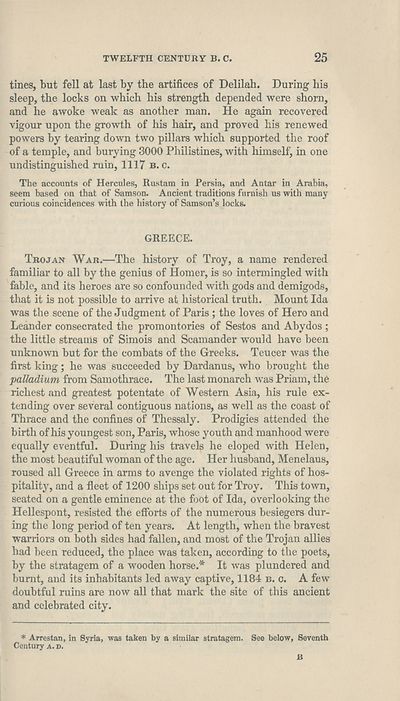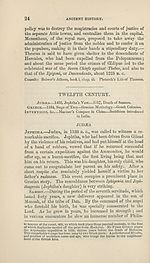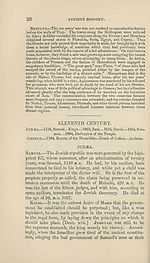Download files
Complete book:
Individual page:
Thumbnail gallery: Grid view | List view

TWELFTH CENTURY B. C.
25
tines, but fell at last by the artifices of Delilah. During his
sleep, the locks on which his strength depended were shorn,
and he awoke weak as another man. He again recovered
vigour upon the growth of his hair, and proved his renewed
powers by tearing down two pillars which supported the roof
of a temple, and burying 3000 Philistines, with himself], in one
undistinguished ruin, 1117 b. c.
The accounts of Hercules, Rustam in Persia, and Antar in Arabia,
seem based on that of Samson. Ancient traditions furnish us with many
curious coincidences with the history of Samson’s locks.
GREECE.
Trojan War.—The history of Troy, a name rendered
familiar to all by the genius of Homer, is so intermingled with
fable, and its heroes are so confounded with gods and demigods,
that it is not possible to arrive at historical truth. Mount Ida
was the scene of the Judgment of Paris; the loves of Hero and
Leander consecrated the promontories of Sestos and Abydos ;
the little streams of Simois and Scamander would have been
unknown but for the combats of the Greeks. Teucer was the
first king; he was succeeded by Dardanus, who brought the
palladium from Samothrace. The last monarch was Priam, the
richest and greatest potentate of Western Asia, his rule ex¬
tending over several contiguous nations, as well as the coast of
Thrace and the confines of Thessaly. Prodigies attended the
birth of his youngest son, Paris, whose youth and manhood were
equally eventful. During his travels he eloped with Helen,
the most beautiful woman of the age. Her husband, Menelaus,
roused all Greece in arms to avenge the violated rights of hos¬
pitality, and a fleet of 1200 ships set out for Troy. This town,
seated on a gentle eminence at the foot of Ida, overlooking the
Hellespont, resisted the efforts of the numerous besiegers dur¬
ing the long period of ten years. At length, when the bravest
warriors on both sides had fallen, and most of the Trojan allies
had been reduced, the place was taken, according to the poets,
by the stratagem of a wooden horse.* It was plundered and
burnt, and its inhabitants led away captive, 1184 n. c. A few
doubtful ruins are now all that mark the site of this ancient
and celebrated city.
* Arrestan, in Syria, was taken by a similar stratagem. See below, Seventh
Century A. n.
25
tines, but fell at last by the artifices of Delilah. During his
sleep, the locks on which his strength depended were shorn,
and he awoke weak as another man. He again recovered
vigour upon the growth of his hair, and proved his renewed
powers by tearing down two pillars which supported the roof
of a temple, and burying 3000 Philistines, with himself], in one
undistinguished ruin, 1117 b. c.
The accounts of Hercules, Rustam in Persia, and Antar in Arabia,
seem based on that of Samson. Ancient traditions furnish us with many
curious coincidences with the history of Samson’s locks.
GREECE.
Trojan War.—The history of Troy, a name rendered
familiar to all by the genius of Homer, is so intermingled with
fable, and its heroes are so confounded with gods and demigods,
that it is not possible to arrive at historical truth. Mount Ida
was the scene of the Judgment of Paris; the loves of Hero and
Leander consecrated the promontories of Sestos and Abydos ;
the little streams of Simois and Scamander would have been
unknown but for the combats of the Greeks. Teucer was the
first king; he was succeeded by Dardanus, who brought the
palladium from Samothrace. The last monarch was Priam, the
richest and greatest potentate of Western Asia, his rule ex¬
tending over several contiguous nations, as well as the coast of
Thrace and the confines of Thessaly. Prodigies attended the
birth of his youngest son, Paris, whose youth and manhood were
equally eventful. During his travels he eloped with Helen,
the most beautiful woman of the age. Her husband, Menelaus,
roused all Greece in arms to avenge the violated rights of hos¬
pitality, and a fleet of 1200 ships set out for Troy. This town,
seated on a gentle eminence at the foot of Ida, overlooking the
Hellespont, resisted the efforts of the numerous besiegers dur¬
ing the long period of ten years. At length, when the bravest
warriors on both sides had fallen, and most of the Trojan allies
had been reduced, the place was taken, according to the poets,
by the stratagem of a wooden horse.* It was plundered and
burnt, and its inhabitants led away captive, 1184 n. c. A few
doubtful ruins are now all that mark the site of this ancient
and celebrated city.
* Arrestan, in Syria, was taken by a similar stratagem. See below, Seventh
Century A. n.
Set display mode to:
![]() Universal Viewer |
Universal Viewer | ![]() Mirador |
Large image | Transcription
Mirador |
Large image | Transcription
| Antiquarian books of Scotland > Education > Elements of universal history on a new and systematic plan > (45) |
|---|
| Permanent URL | https://digital.nls.uk/127580680 |
|---|
| Description | Thousands of printed books from the Antiquarian Books of Scotland collection which dates from 1641 to the 1980s. The collection consists of 14,800 books which were published in Scotland or have a Scottish connection, e.g. through the author, printer or owner. Subjects covered include sport, education, diseases, adventure, occupations, Jacobites, politics and religion. Among the 29 languages represented are English, Gaelic, Italian, French, Russian and Swedish. |
|---|

